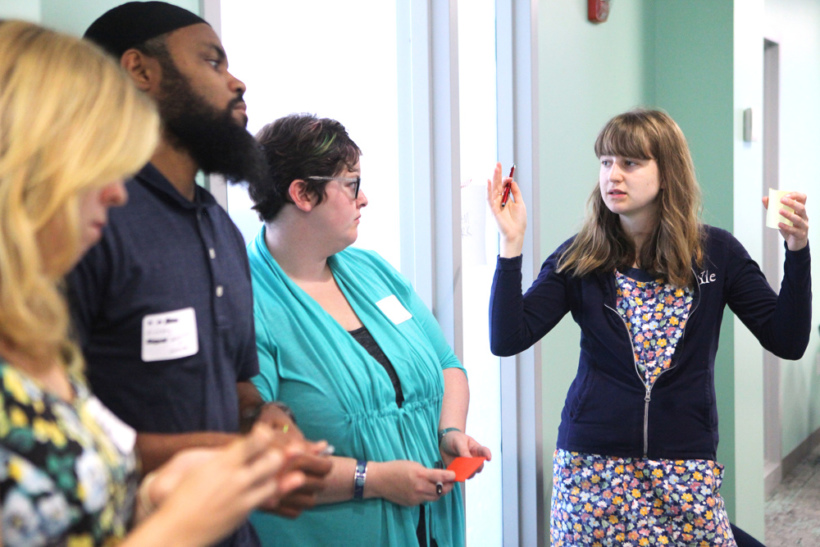News
From the Newsletter: WW Academy Approved as Degree-Granting Graduate School, Design Fellows Begin Work

At the end of October, the Woodrow Wilson Academy of Teaching and Learning was formally approved as a graduate school by the Massachusetts Board of Higher Education. The competency-based master’s in education degree offered by the WW Academy will blend online, face-to-face, and clinical education to prepare graduates for 21st-century classrooms.
In 2015, the Woodrow Wilson National Fellowship Foundation announced its intent to develop competency-based master’s degree programs in teaching and school leadership through the new WW Academy. In 2016, the Commonwealth of Massachusetts granted informal approval for the Academy to offer initial, post-baccalaureate licensure for middle and secondary school teachers in biology, chemistry, and math.
In September, the WW Academy’s inaugural class of Design Fellows set about their work helping Academy faculty and staff redesign teacher preparation. The ten Fellows will spend the next year testing and refining the WW Academy’s curriculum and brainstorming and designing elements of the program, and learning the skills that today’s—and tomorrow’s—teachers need.
Fellow Mustafa Abdul-Rahim comes to the WW Academy after a year of teaching math at an independent school in Connecticut. A world-ranked decathlete, Mr. Abdul-Rahim holds a B.A. in engineering and a master’s of engineering management from Dartmouth. “I see this as an opportunity to be a part of something big, something groundbreaking,” he says.
As a recent statistics graduate from Yale, Jane Strauch considered her options for getting teacher licensure. Not entirely convinced of the affordability of other graduate schools, or of the quality of preparation in teacher-corps programs, she decided the WW Academy was the perfect fit.
“I really knew I wanted to walk into my first classroom being as prepared as I possibly could be. It’s so amazing here that not only is someone teaching me how to teach, but I also get to think about what might be the best way for me to learn,” says Ms. Strauch. “I’ll come out of the program with more than one kind of expertise—not only will I hopefully be a great teacher, but I’ll have all this knowledge about the teacher education field.”
Breauna Campbell is an Olin College grad who left her job as a validation engineer in Indiana to enroll at the WW Academy. She hopes to tap all the available resources, from partner districts to MIT researchers, to help inform the program.
“I am excited to be a part of forming the Academy from the ground up—to think about not just becoming a teacher, but what makes for a good teacher and what makes for a good learning experience on the student side as well,” says Ms. Campbell.
Despite their varying backgrounds and experiences, the Design Fellows share both an excitement and a sense of determination about transforming education.
“I’m doing it to make an impact, to change the world,” says Xavier Tirado, a recent Oberlin graduate (biology/sociology) from Chicago. “I just want to take the tools and the information that I’ve been given and have learned and take that back home and make change in the communities that need it the most.”
Alexandra Trunnell just completed her B.S. in physics and astronomy at Vassar at the age of 19. She decided to pursue science teaching thanks to a high school physics teacher who had real zeal for the subject.
“I had this concept of someone who loved something so intensely that they didn’t want to study it, they didn’t want to sit in a lab and do research, they wanted to share it,” says Ms. Trunnell. “That sparked a love of education in me.”
As the Design Fellows get settled into Cambridge this fall and continue to refine and test the WW Academy model, they are hopeful about the future impact of the master’s program.
“I’ve always seen education and the accumulation of knowledge of the world as a way for society to be more equitable,” says Ms. Campbell. “I hope that we attract other teacher candidates who are excited about the future of education.”
“It’s a once in a lifetime program,” says Ms. Trunnell. “It’s a once in a lifetime opportunity, and it is creating the future that I wanted in science education.”
###
This story appeared in the fall/winter 2017 issue of Fellowship, the newsletter of the Woodrow Wilson Foundation. To see the full newsletter, click here.

